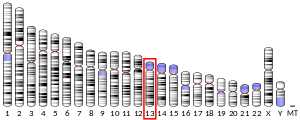HSPH1
Heat shock protein 105 kDa is a protein that in humans is encoded by the HSPH1 gene.[5][6][7]
Interactions
References
- 1 2 3 GRCh38: Ensembl release 89: ENSG00000120694 - Ensembl, May 2017
- 1 2 3 GRCm38: Ensembl release 89: ENSMUSG00000029657 - Ensembl, May 2017
- ↑ "Human PubMed Reference:".
- ↑ "Mouse PubMed Reference:".
- ↑ Scanlan MJ, Chen YT, Williamson B, Gure AO, Stockert E, Gordan JD, Tureci O, Sahin U, Pfreundschuh M, Old LJ (Jun 1998). "Characterization of human colon cancer antigens recognized by autologous antibodies". Int J Cancer. 76 (5): 652–8. doi:10.1002/(SICI)1097-0215(19980529)76:5<652::AID-IJC7>3.0.CO;2-P. PMID 9610721.
- ↑ Ishihara K, Yasuda K, Hatayama T (Mar 1999). "Molecular cloning, expression and localization of human 105 kDa heat shock protein, hsp105". Biochim Biophys Acta. 1444 (1): 138–42. doi:10.1016/s0167-4781(98)00254-1. PMID 9931472.
- ↑ "Entrez Gene: HSPH1 heat shock 105kDa/110kDa protein 1".
- ↑ Saito, Youhei; Doi Kazuya; Yamagishi Nobuyuki; Ishihara Keiichi; Hatayama Takumi (Feb 2004). "Screening of Hsp105alpha-binding proteins using yeast and bacterial two-hybrid systems". Biochem. Biophys. Res. Commun. United States. 314 (2): 396–402. doi:10.1016/j.bbrc.2003.12.108. ISSN 0006-291X. PMID 14733918.
Further reading
- Dawson SJ, White LA (1992). "Treatment of Haemophilus aphrophilus endocarditis with ciprofloxacin". J. Infect. 24 (3): 317–20. doi:10.1016/S0163-4453(05)80037-4. PMID 1602151.
- Nagase T, Seki N, Ishikawa K, et al. (1997). "Prediction of the coding sequences of unidentified human genes. VI. The coding sequences of 80 new genes (KIAA0201-KIAA0280) deduced by analysis of cDNA clones from cell line KG-1 and brain". DNA Res. 3 (5): 321–9, 341–54. doi:10.1093/dnares/3.5.321. PMID 9039502.
- Hatayama T, Yasuda K, Yasuda K (1998). "Association of HSP105 with HSC70 in high molecular mass complexes in mouse FM3A cells". Biochem. Biophys. Res. Commun. 248 (2): 395–401. doi:10.1006/bbrc.1998.8979. PMID 9675148.
- Ishihara K, Yasuda K, Hatayama T (2000). "Phosphorylation of the 105-kDa heat shock proteins, HSP105alpha and HSP105beta, by casein kinase II". Biochem. Biophys. Res. Commun. 270 (3): 927–31. doi:10.1006/bbrc.2000.2541. PMID 10772927.
- Hylander BL, Chen X, Graf PC, Subjeck JR (2000). "The distribution and localization of hsp110 in brain". Brain Res. 869 (1–2): 49–55. doi:10.1016/S0006-8993(00)02346-5. PMID 10865058.
- Strausberg RL, Feingold EA, Grouse LH, et al. (2003). "Generation and initial analysis of more than 15,000 full-length human and mouse cDNA sequences". Proc. Natl. Acad. Sci. U.S.A. 99 (26): 16899–903. Bibcode:2002PNAS...9916899M. doi:10.1073/pnas.242603899. PMC 139241. PMID 12477932.
- Ishihara K, Yamagishi N, Hatayama T (2003). "Protein kinase CK2 phosphorylates Hsp105 alpha at Ser509 and modulates its function". Biochem. J. 371 (Pt 3): 917–25. doi:10.1042/BJ20021331. PMC 1223342. PMID 12558502.
- Saito Y, Yamagishi N, Ishihara K, Hatayama T (2003). "Identification of alpha-tubulin as an hsp105alpha-binding protein by the yeast two-hybrid system". Exp. Cell Res. 286 (2): 233–40. doi:10.1016/S0014-4827(03)00054-5. PMID 12749852.
- Chen WF, Huang MH, Tzang CH, et al. (2003). "Inhibitory actions of genistein in human breast cancer (MCF-7) cells". Biochim. Biophys. Acta. 1638 (2): 187–96. doi:10.1016/s0925-4439(03)00082-6. PMID 12853125.
- Kai M, Nakatsura T, Egami H, et al. (2004). "Heat shock protein 105 is overexpressed in a variety of human tumors". Oncol. Rep. 10 (6): 1777–82. doi:10.3892/or.10.6.1777. PMID 14534695.
- Piechotta K, Garbarini N, England R, Delpire E (2004). "Characterization of the interaction of the stress kinase SPAK with the Na+-K+-2Cl− cotransporter in the nervous system: evidence for a scaffolding role of the kinase". J. Biol. Chem. 278 (52): 52848–56. doi:10.1074/jbc.M309436200. PMID 14563843.
- Saito Y, Doi K, Yamagishi N, et al. (2004). "Screening of Hsp105alpha-binding proteins using yeast and bacterial two-hybrid systems". Biochem. Biophys. Res. Commun. 314 (2): 396–402. doi:10.1016/j.bbrc.2003.12.108. PMID 14733918.
- Dunham A, Matthews LH, Burton J, et al. (2004). "The DNA sequence and analysis of human chromosome 13". Nature. 428 (6982): 522–8. Bibcode:2004Natur.428..522D. doi:10.1038/nature02379. PMC 2665288. PMID 15057823.
- Ballif BA, Villén J, Beausoleil SA, et al. (2005). "Phosphoproteomic analysis of the developing mouse brain". Mol. Cell. Proteomics. 3 (11): 1093–101. doi:10.1074/mcp.M400085-MCP200. PMID 15345747.
- Gerhard DS, Wagner L, Feingold EA, et al. (2004). "The status, quality, and expansion of the NIH full-length cDNA project: the Mammalian Gene Collection (MGC)". Genome Res. 14 (10B): 2121–7. doi:10.1101/gr.2596504. PMC 528928. PMID 15489334.
- Kim JE, Tannenbaum SR, White FM (2005). "Global phosphoproteome of HT-29 human colon adenocarcinoma cells". J. Proteome Res. 4 (4): 1339–46. doi:10.1021/pr050048h. PMID 16083285.
- Rual JF, Venkatesan K, Hao T, et al. (2005). "Towards a proteome-scale map of the human protein-protein interaction network". Nature. 437 (7062): 1173–8. Bibcode:2005Natur.437.1173R. doi:10.1038/nature04209. PMID 16189514.
- Miyazaki M, Nakatsura T, Yokomine K, et al. (2005). "DNA vaccination of HSP105 leads to tumor rejection of colorectal cancer and melanoma in mice through activation of both CD4 T cells and CD8 T cells". Cancer Sci. 96 (10): 695–705. doi:10.1111/j.1349-7006.2005.00093.x. PMID 16232202.
This article is issued from
Wikipedia.
The text is licensed under Creative Commons - Attribution - Sharealike.
Additional terms may apply for the media files.





